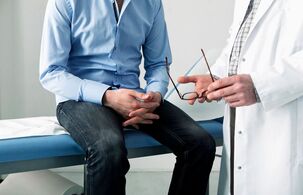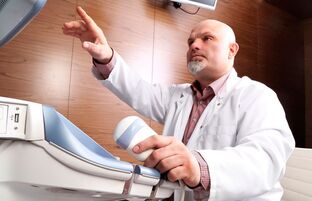Prostatitis is an inflammation of the prostate gland, which is mainly diagnosed in people over 35-45 years of age. Such diseases can only occur in men, because the prostate gland is not present in the female body. Why does the disease occur, and what factors contribute to its development? How to treat prostatitis, and what are the risks of complications?
Prostatitis in men
Given the disappointing statistics, the incidence of prostatitis is on the rise. Currently, prostate inflammation affects almost half of the entire male population aged 30 to 70 years. It should be noted that prostatitis will develop if treated incorrectly or not. Immediate access to a doctor is fraught with negative consequences in the form of complications: glandular abscess or infertility.
The prostate gland is a round organ located under the bladder and involved in the formation of sperm (semen). During ejaculation, parts of the prostate muscle contract, preventing semen from entering the bladder and urine entering the semen. Gland dysfunction can cause male infertility.
There are several classifications of prostatitis, differentiate:
- acute inflammation of the prostate gland;
- chronic and non-bacterial prostatitis;
- asymptomatic disease.
Inflammation of the prostate is often accompanied by vesiculitis or urethritis (inflammation of the urethra).
Acute prostatitis
The acute form of the disease usually occurs spontaneously and is accompanied by many unpleasant symptoms. This condition requires immediate medical attention. Staphylococci, Pseudomonas aeruginosa or Escherichia coli and enterobacter can provoke acute inflammatory processes. Some microorganisms are part of the normal microflora, but entering the prostate gland, they can provoke the development of tissue inflammation.
There are several types of acute inflammation:
- catarrhal;
- parenchymal;
- follicular;
- abs abscess.
Acute prostatitis is easily diagnosed by a qualified and experienced doctor using modern laboratory tests. Severe symptoms and a typical clinical picture will make it possible to make a diagnosis quickly and correctly. Treat acute diseases as a whole. Initially, antibiotics are used, which will eliminate the pathogen infection. Also, effective therapies will include: drugs to strengthen the immune system, drugs to improve blood circulation in the glands, physiotherapy procedures if necessary. But the benefits of massage for prostatitis have not been proven.
Chronic bacterial prostatitis
Chronic prostatitis with bacterial etiology is a disease of the prostate gland that has characteristic symptoms. Among the symptoms of the disease, pain syndrome, urinary disorders, and psychological discomfort can be distinguished. Changes in the type of inflammation can also occur in biological fluids, including glandular secretions, semen and urine. Chronic bacterial prostatitis always has a pathogenic agent, which is determined using tiered laboratory tests.
Infectious prostatitis is most often associated with microorganisms of the genus Enterobacteriaceae. The main causative agents of prostatitis are Trichomonas, ureplasma, gonococcus, mycoplasma, chlamydia, gardnerella. Inflammation can be caused by Mycobacterium tuberculosis or a fungus of the genus Candida if a man is infected with HIV. Other pathogenic microorganisms, including Klebsiella, Proteus and Enterococcus, provoke the disease.
Prostatitis is not a chronic bacterial
Chronic non-bacterial prostatitis may have signs of inflammation or almost no symptoms. Only a competent urologist can identify the disease and make a diagnosis, based on the full diagnosis of the patient's condition.
Inflammatory prostatitis
Chronic non-bacterial prostatitis with signs of inflammation can be diagnosed through patient complaints and laboratory test results. In the secretion of the gland after massaging the prostate, there is an increase in the content of leukocytes. Pathogenic microorganisms were not detected.
Non-inflammatory prostatitis and chronic pelvic pain syndrome
If at the time of diagnosis the urologist did not detect the infection, then the diagnosis may sound like non-inflammatory prostatitis. The main symptoms of the disease in this case are persistent / recurrent and prolonged pain in the pelvic area. Such an unpleasant syndrome can last up to 2-4 months.
Chronic prostatitis without symptoms
Chronic prostatitis without symptoms is almost asymptomatic. Such gland inflammation occurs without visible symptoms. Doctors can detect problems due to the secretion of leukocytes and bacteria periodically or continuously in the urine. This form of the disease is treated with non-steroidal anti-inflammatory drugs and antibiotics.
Practice shows that the symptoms of prostate gland tissue inflammation can be easily confused with other pathologies affecting the pelvic organs. Medications alone can cause complications, the development of additional diseases or critical conditions.
Causes of prostatitis in men

It is not possible to talk about the only cause of inflammation of the prostate gland, as the disease is multifactorial and can appear on the background of various conditions. Provides hormonal disorders, hypothermia, significant decrease in immune defenses, circulatory disorders, STD infections and sexual abstinence.
Infectious
Pathogenic microorganisms can enter the prostate gland during inflammation that occurs in the bladder and urethra. The infection can also penetrate the prostate caused by hematogenous, for example, from purulent foci (during tonsillitis, pneumonia or furunculosis). The causative agents are: Escherichia coli, staphylococci and enterococci.
Symptoms of prostatitis often appear due to venereal disease. Inflammation of the prostate gland occurs due to infections that affect organ tissue. Acute prostatitis can be caused by the herpes virus or mycoplasma infection, which not only affects the reproductive system. Chlamydia is also worth mentioning. Gram-negative intracellular microorganisms cause about 40-60% of all urogenital infections.
The secretion of glands contains bacteria that prevent the development of infections in organs. For the infection to spread, and the inflammatory process to occur, additional factors are needed, including stagnation in the small pelvic circulatory system or glandular secretion stasis.
Hypothermia, which significantly reduces the activity of immune cells and the protective function of mucous membranes, can be attributed to factors that contribute to the spread or activation of infection. This also includes excessive physical and neuropsychic work, which has a negative impact on immunity.
Non-communicable
There are several causes of non-infectious tissue inflammation in the prostate gland. Signs of prostatitis may appear due to a violation of the overall mechanism of the urinary excretion process, as urination is performed due to periodic relaxation of the circular muscles of the prostate and bladder. Various violations of this process, including failures associated with the variability of muscle function (tension and contraction of tissues), contribute to the entry of urine into the prostate canal. This condition can adversely affect the organs, causing irritation and, consequently, symptoms of prostatitis.
Improper lengthening, sexual intercourse or prolonged abstinence can also cause symptoms or the development of prostatitis. Stagnation and swelling of the prostate gland can cause secretions in the glands, which are fully formed, but not removed from the organ or partially excreted.
Circulatory disorders and irregular lifestyle
Neat underwear, too tight a belt, tight pants and shorts, and an inactive lifestyle are often the causes of circulatory disorders in the pelvic area. The glands overflow with blood, there are blood vessels that squeeze, there is a delay in the transport of nutrients. Such changes lead to impaired glandular function.
Hormonal Disorders
The amount of sex hormones plays a special role in the function of the prostate gland. They are able to influence the activity of prostate cells. And excess hormones can increase the risk of signs of prostatitis.
The prostate gland is involved in stabilizing the hormonal balance in the genital area, and organ dysfunction causes damage. In particular, in chronic prostatitis, dihydrotestosterone decreases and estrogen saturation increases. The scale of hormonal imbalance in prostatitis will depend on the characteristics and stage of the disease, which can only be determined by a specialist.
Prostatitis Symptoms

All obvious signs of prostatitis are complex of various disorders. Moreover, each type of disease can have its own symptoms. For example, acute prostatitis can be accompanied by fever, a sudden increase in body temperature and symptoms of severe body poisoning. Severe ejaculation and decreased sexual desire.
All symptoms of prostatitis can be divided into 3 separate categories:
- urinary disorders;
- problems with sexual function;
- mental disorders.
Urinary problems as a sign of prostatitis
All urinary patient-related complaints may appear because:
- irritation of nerve endings, which occurs against the background of inflammatory processes;
- urethral lumen narrowing.
In this case, the symptoms of prostatitis may be:
- jet slow;
- Difficulty starting urination and emptying drop by drop;
- feels that the bladder is not completely emptied;
- hard drive to urinate;
- urinary incontinence during urination;
- increased urination.
Pain syndrome
Painful discomfort with prostatitis can be detected in the lower abdomen. Pain can be given to the lower back, groin, scrotum and even to the anus. Also, patients may complain of pain in the groin after being in a sitting position for a long time. The pain can be sharp or dull.
Disorders in intimate life
Symptoms of prostatitis include problems in the intimate area:
- decreased libido;
- ejaculatory disorders (increase or decrease in semen volume);
- erectile dysfunction, complete or partial sexual dysfunction;
- pain during ejaculation.
Among the signs of prostatitis, one can distinguish a dim and moist orgasm, as well as the removal of the urethra with mucus consistency.
Mental imbalance
Men often experience psychological problems when dealing with diseases of the genitourinary system. Because of problems with erections, pain or rapid ejaculation, patients may become isolated, become aggressive towards others, or just feel anxious, scared. Stress emerges that can negatively affect the immune system, weakening it significantly.
Along with depression, psychological experiences arise, expectations of failure in intimate life. Doctors often talk about the importance of paying attention to the psychological state of patients with chronic inflammation of the prostate gland.
Diagnostic prostatitis

A doctor prescribes a comprehensive diagnostic for patients with urological problems. If prostatitis is suspected, laboratory tests, ultrasound, digital examination of the rectum are performed. If, after undergoing prescribed therapy, the symptoms of the disease do not go away, the urologist can refer the patient for additional diagnostics:
- blood culture;
- computerized or magnetic resonance imaging;
- bacteriological examination of semen.
Urological examination
Urological examination by a doctor is an important first step, without which it is impossible to make a correct diagnosis. Thanks to the visual examination and clinical picture, the specialist will determine the possibility of the disease and prescribe a number of additional diagnostic procedures.
Digital gland examination is a mandatory method. This procedure is performed through the anus. Usually, examination does not cause pain in the patient, although mild discomfort is usually observed. During the urological examination, the doctor will consider the complaint, the age of the patient, and the presence of chronic pathology.
Laboratory research
There is a list of urological methods for male laboratory examinations, which include general urinalysis and blood tests for HIV, markers of hepatitis C and B, and even RW. Patients with suspected inflammatory processes in the prostate gland are often prescribed:
- urine analysis, which determines the presence of pathogenic flora;
- glandular secretion examination;
- blood tests for sexually transmitted infections and the presence of prostate-specific antigens to exclude oncology.
Ultrasound examination of the prostate, bladder and kidneys
If there is prostatitis, a single ultrasound examination of the glands, bladder and kidneys is done to make a diagnosis. With the help of such a diagnosis, a physician can identify almost all pathological changes, including tumors and tissue inflammation. Ultrasound helps assess not only the condition of the organs, but also the blood flow. If necessary, for better organ visualization, transrectal studies are performed.
With an ultrasound scan of the prostate, the doctor evaluates the shape, size, structure, as well as the density and homogeneity of the organ. Signs of prostatitis with ultrasound diagnostics are easily identified. Also, depending on the results of the study, adenomas and tumors, including cancer, can be detected.
In case of inflammation of the prostate gland, for clinical imaging equipment, a urologist prescribes an ultrasound of the kidneys and bladder. Effective diagnosis can identify:
- cyst entry;
- presence of calcification;
- tissue compaction;
- contour distortion;
- changes in tissue echogenicity;
- organ size, connection and echo density.
Only a doctor can make a diagnosis based on ultrasound results. Making inferences or prescribing your own treatment is dangerous and threatening with serious consequences.
Uroflowmetry
Uroflowmetry is a medical diagnosis. This method records the speed of urine during urination, which allows you to identify violations related to the patency of the ducts, their muscle tissue activity and tone. It is done on special equipment - using digital graphics and pictures, the uroflowmeter will make a sketch of the result.
Prostatitis Treatment

It is not possible to talk about the treatment of prostatitis as a specific list of manipulations and measures, as there are several types of diseases and each requires its own therapy.
Treatment of prostatitis with folk remedies
Treatment of prostatitis at home can be carried out only after consulting a doctor. A competent physician will prescribe medication, and possibly physiotherapy and therapy training. Traditional medicine recipes may also be recommended, but may not be the primary method of therapy.
Treatment of prostatitis at home should be done with caution and take into account all the recommendations of the doctor. Urologists may recommend infusions and herbal ingredients, candles with honey and syrup. It is important to know that any alternative medicine recipe has its own contraindications. Do not self-medicate and purchase the items in question, including masseurs, bracelets, prostatitis plasters, underwear or special pillows. Unauthorized purchase and use of medication without a doctor's advice can be a fatal mistake, as additional illnesses will appear or the patient's condition will worsen.
Home herbal prostatitis treatment
Herbal remedies for prostatitis can help relieve the symptoms of unpleasant glandular inflammation. It is used as an adjunct to medical therapy (medicine). The urologist, if necessary, will prescribe a useful recipe, based on the characteristics of the patient's condition, his age and the presence of chronic pathology.
Treating prostatitis at home requires a serious attitude towards your health. You can prepare a bath or enema based on herbal preparations at home, but the doctor should indicate the components, methods of preparation and dosage. In such cases, it is most often recommended to use: creeping cumin ingredients, pharmaceutical chamomile flowers, swamp creeper, sage, corn stigma, ivan tea, marshmallow root, licorice rhizome and linden inflorescences.
Also Popular:
- Pasli. It has a strengthening effect on blood vessels and has an anti-inflammatory effect. The seeds are very useful, they are added in crushed form to various alternative medicine recipes.
- Ginseng. The roots of this plant increase the tone of blood vessels. Has a stimulating effect.
- St. John's wort. This plant has antibacterial and soothing properties. This ingredient is indispensable for depressive disorders, for the prevention and treatment of stress, which, for example, may occur against the background of erectile dysfunction.
Provided that all medical prescriptions are followed, certain traditional medicine recipes may enhance the therapeutic effect.
Hirudotherapy
Hirudotherapy to treat prostatitis at home raises many doubts among experts around the world. Therapy using medicinal leeches grown specifically in biofactors is to some extent curable, and the saliva of annelid worms also has healing properties. It contains several useful active ingredients, among which hirudin should be highlighted. With prostatitis, leeches are applied to the skin just above the pubis, in the groin and anus. Therapy has its own nuances, which will be told by the doctor. Self-medication is dangerous.
In what cases can prostatitis not be treated at home?
There are a number of alarming symptoms of acute or chronic prostatitis, where it is important to seek the help of a competent physician immediately:
- sharp pain in the lower abdomen;
- bleeding during urination;
- blood in feces;
- increased body temperature, dizziness, chills, vomiting.
Home prostatitis treatment is important to do under strict urological supervision. Any medication or prescription of alternative medicine must be discussed with your doctor before use. Do not take your own medicine for advice, for example, a friend or pharmacist at the pharmacy. You risk damaging your body and provoking the appearance of a number of negative reactions.
Treatment of prostatitis with folk remedies without consulting a specialist can end in failure. Take care of your health.
Treatment of prostatitis in men: drugs

What is the medical treatment for prostatitis in men, what kind of medicine is prescribed by the doctor? Typically, therapies for acute and chronic prostatitis include antibiotics. It is recommended to choose such drugs by considering the culture, which determines the sensitivity to certain antibiotics.
Remedies for prostatitis: antibiotics and anti-inflammatory drugs
Treatment for prostatitis can only be prescribed by a doctor, based on the patient's diagnosis, including answers from laboratory texts. It is important to know that prostatitis agents of betalaktam and nitrafurans groups are ineffective, as they cannot penetrate into prostate tissue. There is no need to expect good results from the treatment of such prostatitis.
Currently, drugs from the group of fluoroquinolones and macrolides show the best results in the treatment of prostatitis in men. To relieve the symptoms associated with urinary disorders, urologists can prescribe medications for prostatitis in the form of alpha blockers, as well as anti-inflammatory drugs. Herbal remedies, hormone medications and medications for immune correction are popular.
Traditional medical treatment of prostatitis in men can be supplemented with physical therapy. Such therapeutic techniques are used as a remedy for prostatitis if there are no symptoms of an acute form of the disease.
Prostatitis patch
Today, men with prostate inflammation often hear about prostatitis spots. Manufacturers of the product in question offer quality prevention or rapid recovery.
This therapy should not be referred to as the treatment of prostatitis with folk remedies. It is not related to alternative medicine, but is not used by a qualified physician. Patches for prostatitis have no evidence base. Both the doctor and the actual customer reviews confirm the effectiveness of the Chinese universal patch for prostatitis.
Supporters of prostatitis
Suppositories for prostatitis are prescribed most often along with antibiotics and anti-inflammatory drugs. Rectal suppositories can eliminate the cause of prostatitis, have a healing effect, and relieve tissue inflammation. Suppositories for prostatitis are basically similar to microclysters. The only suppository consists of fat and oil, and the enema is water.
Coconut oil is most often the basis of suppositories for prostatitis. It is this component that contributes to the almost instantaneous absorption of the drug into the intestinal wall. Also, suppositories for prostatitis often contain vitamins.
Physiotherapy as a complement to prostatitis

If we consider all the complex prostatitis treatments in men, then medication is the main part of therapy. Physiotherapy is an additional method to help treat prostatitis in men. Determine the procedure for inflammation of the prostate gland, provided there are no acute symptoms.
If you do not know how and how prostatitis in men is treated using physiotherapy, then the most common of these should be noted:
- electrophoresis of the drug;
- UHF therapy (treatment with electric field using capacitor plate);
- magnetotherapy (effect of magnetic field therapy on the patient's body);
- mud therapy;
- microclucers with herbal infusions and decoctions (such physiotherapy is the treatment of chronic acute prostatitis with folk remedies);
- general and local baths use different fluids and temperature conditions;
- galvanization (exposure to direct current at low voltage in the human body).
How to treat prostatitis, gland massage
A popular method of treating prostatitis - massage today (according to a number of studies) has no evidence of its effectiveness. If a man has prostatitis, massage can be used to stimulate the secretion of secretions from the prostate gland. Such manipulations are performed through the anus with the help of fingers only in medical institutions under the guidance of specialists.
It is strictly forbidden, if there is prostatitis, to massage with adenomas and glandular cysts, cracks in the anus, with urinary retention and increased body temperature. Acute infectious processes in the bladder or kidneys are also contraindicated.






























